
An economy is an area of the production, distribution, or trade, and consumption of goods and services by different agents in a given geographical location. Understood in its broadest sense, 'The economic is defined as a social domain that emphasizes the practices, discourses, and material expressions associated with the production, use and management of resources'. Economic agents can be individuals, businesses, organizations, or governments. Economic transactions occur when two parties agree to the value or price of the transacted good or service, commonly expressed in a certain currency, but monetary transactions are only a small part of the economic domain.
Economic activity is spurred by production which uses natural resources, labor, and capital. It has changed over time due to technology (automation, accelerator of process, reduction of cost functions), innovation (new products, services, processes, new markets, expands markets, diversification of markets, niche markets, increases revenue functions) such as that which produces intellectual property and changes in industrial relations (for example, child labor being replaced in some parts of the world with universal access to education).
A given economy is the result of a set of processes that involves its culture, values, education, technological evolution, history, social organization, political structure and legal systems, as well as its geography, natural resource endowment, and ecology, as main factors. These factors give context, content, and set the conditions and parameters in which an economy functions. In other words, the economic domain is a social domain of human practices and transactions. It does not stand alone.
A market-based economy is where goods and services are produced and exchanged according to demand and supply between participants (economic agents) by barter or a medium of exchange with a credit or debit value accepted within the network, such as a unit of currency.
A command-based economy is where political agents directly control what is produced and how it is sold and distributed.
A green economy is low-carbon, resource efficient, and socially inclusive. In a green economy, growth in income and employment are driven by public and private investments that reduce carbon emissions and pollution, enhance energy and resource efficiency, and prevent the loss of biodiversity and ecosystem services.
Source : Wikipedia


